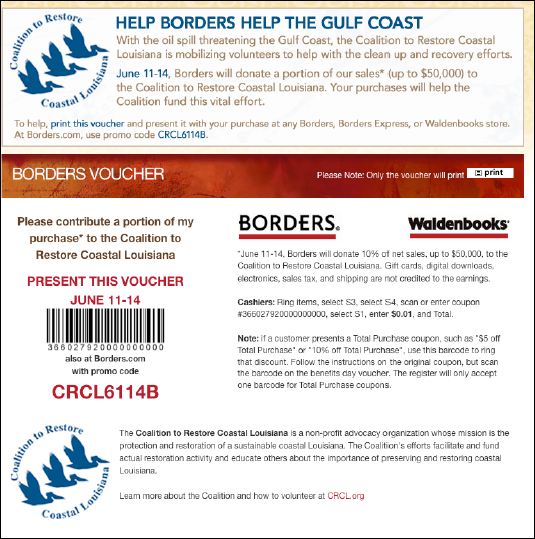If you’re traveling this weekend through through one of the 31 airports that has a Borders bookstore on site,be sure to print out and take along a copy of this Help Borders Help the Gulf Coast coupon.

From June 11 – 14, 2010 Borders will be donating 10% of its weekend sales (up to $50,000) to Gulf Coast relief efforts through the non-profit Coalition to Restore Coastal Louisiana (CRCL). So if you’re going to pick up some reading material for your flight, keep this in mind. (The offer is good at all Borders, Waldenbooks and Borders Express outlets, but some chains specifically exempt airport locations from special promotions, so I checked to make sure.)
Borders will also work with CRCL to recruit volunteers and host info sessions in some Borders stores.
And if you’ve been thinking that you want to fly down to the Gulf Coast to help pick up oil or wash oil-soaked birds, hold on a bit. As I learned while researching this article for msnbc.com, Volunteers needed…just not quite yet, CRCL and pretty much every other volunteer and environmental organization is asking everyone to register their interest and availability, but to sit tight for a few weeks until they can figure out what exactly it is that volunteers from out of town can do.
Here’s an excerpt from my story:
Local, regional and national conservation and environmental organizations are also being inundated with offers of help. While these groups anticipate that volunteers will soon be needed for everything from shoreline clean-up to Web site management, groups are currently asking that volunteers simply register their interest. “We will contact registered volunteers when an appropriate opportunity is available for you to assist,” reads a message on LA Gulf Response, a consortium Web site made up of the Nature Conservancy, the National Wildlife Federation, The Audubon Society, the Coalition to Restore Coastal Louisiana, and the Barataria-Terrebonne National Estuary Program.
“Good idea,” said David Clemmons of VolunTourism.org. “There’s this desire to go help right away. But if you’re not a professional and not prepared for the conditions you might encounter, it may actually be better to stay away for a while.”
Clemmons interviewed researchers and tourism professionals about the role voluntourists played after events such as the tsunami in Southeast Asia, Hurricane Katrina, and the earthquake in China. “Let the professionals go in first to assess needs and set up systems,” he concludes. “Voluntourism shouldn’t start until at least six months after any natural or man-made disaster.”
That gives you time to mark your calendar, register with a volunteer agency and get trained locally before you head for the Gulf.